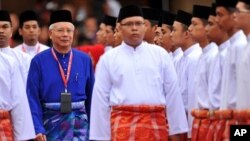In Malaysia, recent opinion polls indicate Prime Minister Najib Razak's approval rating is rising after a series of political victories. The prime minister's political fortunes are fueling speculation he will soon call an early election.
With Najib's approval rating at an all time high of 69 percent, this week his government formally abandoned the dreaded Internal Security Act (ISA), which allowed for detention without trial. And at a recent summit of the Association of Southeast Asian Nations (ASEAN) he succeeded in winning support for his Global Movement of Moderates to help combat religious extremism and terrorism.
Najib has moved to improve relations with the West, culminating in the current visit to Malaysia by British Prime Minister David Cameron, the first since John Major came here in 1993, and an announcement that both countries plan to double bilateral trade.
Din Merican, an Associate Fellow with the Malaysian Institute for Economic Research cites several reasons for the image boost. He notes divisions within the opposition camp headed by Anwar Ibrahim, an improved local economy and the effort to replace the restrictive security law as constributors to Malaysia's improved image abroad. Merican says that has left Prime Minister Najib in a commanding position.
“His main achievements now so far are more on the foreign policy front. It gives Malaysia a new image as a moderate country, there are petty politicians here playing the race and religious issues but overall he is positioning himself and the country as a true moderate," Merican said. "The effects of his foreign policy initiatives are being felt by David Cameron coming here.”
At home, Najib also won support from the Malaysian Bar Council, which has been at odds with the government over issues dating back to the 1980s and 1990s when the autocratic Mahathir Mohammad was at the nation’s helm.
Bar Council President Lim Chee Wee applauded the scrapping of the security act. But he says legislation written to replace those laws had raised concerns about the rights of those accused of terror-related crimes. He says this is now being addressed and reviewed with Malaysia’s Attorney-General.
“With these sorts of movements, what we’ve seen is civil society at the Malaysian bar we play a role in, making sure the government reacts to improving weaknesses in the system. Certainly in the last few years we’ve had three different chief justices -- two of whom have retired -- who have restored confidence and in the present chief justice certainly the bar has the full confidence that the judiciary will be independent.”
Also fueling intense media speculation of an early poll was the enthronement on Wednesday of the 84-year-old Sultan Abdul Halim Mu'adzam Shah as Malaysia’s new king in a lavish ceremony.
Malaysia has had an elected monarchy since independence from Britain in 1957. The monarchy, which is essentially a ceremonial position, rotates every five years among the rulers of the nine Malaysian states still headed by royalty. This is Mr. Shah’s second term on the throne.
Diplomatic sources say the prime minister had wanted to wait until the king had been installed before deciding on whether or not to call an early poll.
However, both Lee and Merican say an early election is not a guarantee. Merican added that the prime minister is in a far more comfortable position than he was three years ago when he ousted his predecessor, Abdullah Ahmad Badawi, from power in a party room coup.
“Yeah, I think there is a lot of speculation over when the election will be held you know. Someone said maybe May, June," Merican speculated. "This morning someone told me probably October but I think the only thing that’s certain is that by March 2013 he must hold the elections. So I think basically he will call the shots whenever he feels comfortable about it.”
Some members of Najib's United Malays National Organization party say he must improve the party's standing if he is to cement his position as an elected Malaysian leader. UMNO lost its cherished two-thirds majority in parliament in 2008. For the moment at least, all the indications are he remains on track to achieve just that.
News
Malaysian PM's Image Boost Could Lead to Early Elections
- By Luke Hunt






